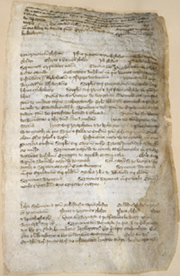 |
 |
 |
 |
 |
 |
 |
|
Fountains Abbey: History
Fountains Abbey: Buildings
|
Chaos at Meaux (25/26) In contempt of the King, the Order and religion … they shut the gates and with ambushes set making a fortress of the abbey of Meaux and did wantonly resist and drive away the abbot of the monastery of Roche who was their visitor and reformer.(90) In 1396 Fountains’ daughter-house of Meaux, in Holderness, was split over the election of its nineteenth abbot. Whereas some, perhaps fearing reform, supported the appointment of their prior, William Wendover, others backed Thomas Burton, who, indeed, was the choice of Abbot Robert Burley of Fountains. As Father Abbot of Meaux, Burley ratified Burton’s election. However, he was accused of rigging the election by Wendover’s supporters, who brought their complaint to the English General Chapter at St Mary Graces, London, and claimed that Burton was an ‘intrusor’. In other words, they declared that Burton’s appointment had been orchestrated by their Father Abbot, Robert Burley of Fountains, and their patron, the earl of Gloucester (lord of Holderness), who had threatened any who refused to submit with imprisonment at Hebden. The Chapter responded by sending the abbots of Furness and Roche to investigate the case. Upon their arrival at Meaux, the delegates were confronted with a scene of insurrection - the gates of the abbey were shut and patrolled by a group of armed men, who had been stationed there by Abbot Robert of Fountains. They brandished bows, arrows and other warlike weapons. As Father Abbot of Meaux, Burley considered this visitation - and any similar ventures -an encroachment on his authority, and had therefore secured papal annulment of this and any other commission. The delegation was therefore unable to gain access to the abbey, but a later visitation made by the abbots of Roche and Garendon was more successful. At a meeting held in the monastery’s guest-house, Thomas Burton’s election was validated and it was agreed that all who had opposed Burton should seek his forgiveness and bestow the kiss of peace. The story did not end here, for the abbot of Fountains, who had not been involved in the arbitration, refused to abide by the terms of reconciliation. He sought to punish the offenders who in turn took their case to Rome and instigated legal proceedings. It was ostensibly to spare his community colossal legal expenses that Burton resigned from the abbacy of Meaux in 1399. He retired to Fountains and received a pension of 40s from Abbot Burley and a spot in the infirmary. It was here that Burton compiled the first book of the chronicle of Meaux, which is preserved in the British Library. Burton lived here until his death in 1437. His tomb slab reads ‘T.B., ninth abbot of Meaux, d. 4 Nones, October 1437. May his soul rest in peace’ and shows a figure holding a broken crozier, since he resigned from the abbacy before his death.(91) |
